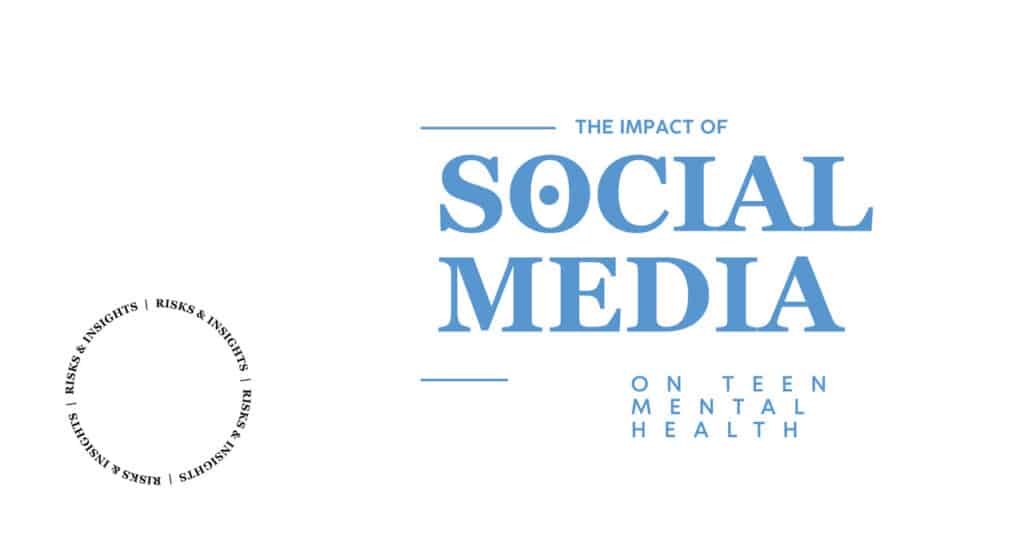Teens cannot help but live by digital streams because, in this technological day and age, being online is a way of life. It’s tough to deny that Instagram, TikTok, Facebook, and Snapchat are considerably affecting teen behavior, perception, and mental health.
The impact of social media on mental health is an increasingly important topic of conversation as researchers, parents, and mental health professionals seek to understand how these digital spaces affect emotional well-being.
Numerous aspects of social media, such as their strengths in promoting connectivity, opportunities for self-growth, and, most importantly, teen-driven group formation, also reveal potential massive threats in their usage.
The Link Between Social Media and Teen Mental Health
The various channels through which youth communicate using social media today are different from those of the past. They use it for entertainment, education, and even meeting friends. However, perhaps the most undeniable effect of social media is on a person’s mental state.
Studies have been conducted showing how overuse of social media leads to a variety of mental health disorders, most often anxiety, depression, and loneliness. However, aside from moods, the effects of social media on youth are issues of self-esteem, body image, and relationships.
Social Comparison and Low Self-Esteem
The most critical aspect of social media’s effects on teens is that it presents a constant form of comparison. Teenagers are very impressionable. Seeing more or less idealized images presented online makes them compare themselves with such imagery in their quest for a mirage that does not appear in real life.
Unrealistic Standards
Images often set impossible standards regarding beauty, success, and happiness, making many adolescents feel inadequate as they benchmark their lives against what’s portrayed on their screens. Continuous exposure to “perfection” makes them feel insecure and lowers their self-esteem because teens begin to think that their reality is not good enough.
This feeling of inadequacy further leads to dissatisfaction with the body and an obsession with appearance. The impact of social media on mental health will be even more apparent if you consider how these forces affect adolescent’s body images, especially during the transition from childhood to adulthood.
Anxiety, Depression, and Social Media
According to research, social media’s impact on teenagers is more profound than just self-esteem because teenage persons who spend more hours using social media report experiencing high levels of anxiety and depression.
Constant exposure to other people’s lives and activities also brings about the feeling of missing out, popularly referred to as FOMO (Fear of Missing Out). This comparison can breed anxiety and, in extreme cases, social isolation, like when the teenager has not been invited to any specific event or feels he/she has been left out of the group chat.
Cyberbullying & Its Impact
Cyberbullying is another emotional reason for disturbance among teens and is common, too. Some other social media effects on youth are trolling or mean comments, which give emotional stress and could even be extremely harmful. Cyberbullying might even prove to be incessant, which can also make them quickly persistent, making youths depressed and even sometimes suicidal.
Sleep Disturbance and Social Media
Another critical effect of social media on teens regarding their sleep is how their social life can affect this factor. Teens are susceptible to the influence that nocturnal screen time exerts. Light from a cell phone, a tablet, or a computer disrupts the normal production process for the sleep-regulating hormone.
As a result, most teenagers spend their late nights scrolling through social media, which harms the quantity and quality of sleep they achieve. Lack of sleep has direct associations with mental health problems, including irritability, inability to concentrate, and emotional instability.
Understanding the Mechanisms Behind Social Media’s Impact on Mental Health
To fully understand the impact of social media on mental health, it is essential to know the mechanisms leading to its influence on teenagers. Why does social media influence young people’s moods and actions? The following psychological factors contribute to this:
The Role of Dopamine and Instant Gratification
Social media platforms are designed to be addictive. Each time a kid gets a like, a comment, or a share, they give them an insignificant amount of dopamine, the brain’s “feel good” chemical. This creates the instant gratification cycle in teens that keeps searching for that next “dopamine hit” out of interaction on social media. It contributes to too much social media usage and social media’s effects on youth.
The constant quest for validation through likes and shares may make teens seek extrinsic validation for their self-worth. Extrinsic validation often becomes the most valuable thing that will make them feel better instead of how they feel inside, such that they eventually become dependent on social media sites for emotional validation. Teens are left to the will of mood swings, depression, and lack of self-esteem when they fail to get the validation that they achieve online.
Fear of Missing Out (FOMO)
Fear of Missing Out is a psychological mechanism that has impacted teens utilizing social media. It denotes fear that something good is about to happen and that somebody is missing it. If teenagers witness their friends enjoying their virtual lives or attending other social events, they would likely feel lonely and excluded.
Such feelings of loneliness and despair are harmful to mental health. It can be said that the impact of social media on the mental health of teenagers increases anxiety and depression while lowering their self-esteem since there is always a constant comparison with others.
Strategies for Parents to Mitigate Social Media’s Impact on Teen Mental Health
Parents have a significant role to play in helping teens move out of the complex relationship that social media has with mental health. Parents can minimize the effects of social media on teens and create an emotionally supporting environment by establishing healthy habits and boundaries.
Set Clear Screen Time Limits
Controlling social media’s impact on teenagers is achieved first by controlling time spent on the screen. A research study indicates that excessive screen use results in poor mental health outcomes, including anxiety and depression. Parents should set limits on time spent using social media to balance online and offline life.
Create Tech-Free Zones and Times
Promote tech-free zones in the home, such as at dinner or in a bedroom setting, so teens are encouraged to turn off their devices and spend that time in conversation with other people present. Games, outdoor activities, and even cooking can also be effective ways of bonding with family.
Encourage Offline Hobbies
This is also important in developing offline interests and hobbies in teenagers. Sports, reading, or music may shift the teen’s focus from social media to performing such tasks. As such, there will be increased self-esteem and confidence as skills are developed in other arenas.
Foster Open Communication
Among the best practices that parents can practice is to raise open, non-judgmental communication. Parents often discuss with their teens the harsh realities and challenges of social media, helping them acquire critical thinking skills with emotional resilience.
Teens need protected spaces where they can have their online experiences discussed without consequences or judgments, especially for issues such as cyberbullying, negative body images, or social exclusion.
Role of Schools in Supporting Teen Mental Health in the Digital Age
School’s essential role is the impact of social media on youth’s ability to interact effectively in the digital world. While there is social media interaction within the school, such relationships, and pressures related to school performance further stress them emotionally.
Educating Teens on Digital Literacy
The most critical aspect is that digital literacy would lead to an understanding of the effect of social media on young people. Schools should develop programs to teach teens how to critically evaluate what they see online, determine false information, and ensure privacy. Teenagers learning to use social media responsibly will avoid some harmful psychological effects associated with applications in the online world.
Providing Mental Health Support Services
Schools should provide access to mental health support services, including counseling and peer support programs, which might help alleviate the psychological pressure that adolescents are exposed to from social media. These services may enable adolescents to be resilient, cope with anxiety or depression, and learn about the pressure of the digital world.
Navigating the Complex World of Social Media and Mental Health
There is no denying the impact of social media on mental health. These portals are a double-edged sword for teens. While providing them with opportunities to connect and be creative, they expose them to risks related to anxiety, depression, and low self-esteem. Parents, teachers, and teens must join hands to work toward an integrated approach to social networking that will foster healthy net practices and emotional well-being.
Healthy boundaries, the development of offline relationships, and proper mental health support in the reduction of the effects of social media on youth will empower successive generations of youth to operate the digital world in their favor and to their all-around well-being.
Call to Action
If you are a parent or educator concerned about social media’s impact on youth, start that dialogue by talking about mental health and social media use. Inspire teens to stay unplugged, model healthy habits and behaviors, and offer emotional support during digital life. Let’s help our teens live happy, healthy lives and balance their digital and other life experiences.
FAQ’s
- How does social media affect teen mental health?
Social media can impact teen mental health by fostering anxiety, depression, and low self-esteem due to comparison, cyberbullying, and unrealistic expectations.
- What are the effects of social media on youth?
Social media can lead to both positive and negative outcomes. While it provides social interaction, it can also cause issues like body image concerns, FOMO, and feelings of isolation.
- How can schools help with teen mental health?
Schools can support teen mental health by promoting digital literacy, offering counseling, and teaching responsible social media use.
- What strategies can parents use to mitigate social media’s impact on teen mental health?
Parents can set boundaries on social media use to promote healthy habits, encourage offline activities, and maintain open communication.
- How does social media contribute to anxiety and depression in teens?
Social media can cause anxiety and depression through social comparison, cyberbullying, and the pressure to meet unrealistic standards, leading to negative emotions and stress.




